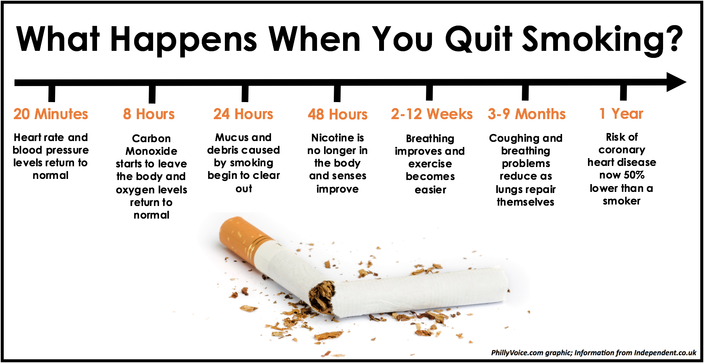#Cravings #HealthNews #Nicotine #NicotineWithdrawal #QuitSmoking #Smokefree
Quitting is hard. But quitting can be a bit easier if you have a plan. When you think you’re ready to quit, here are a few simple steps you can take to put your plan into action.

Know Why You’re Quitting
- Before you actually quit, it’s important to know why you’re doing it.
- Do you want to be healthier?
- Save money? Keep your family safe? If you’re not sure, ask yourself these questions:
- What do I dislike about smoking?
- What do I miss out on when I smoke?
- How is smoking affecting my health?
- What will happen to me and my family if I keep smoking?
- How will my life get better when I quit?
Still not sure? Different people have different reasons for quitting smoking.
Learn How to Handle Your Triggers and Cravings
Triggers are specific persons, places, or activities that make you feel like smoking.
Knowing your smoking triggerscan help you learn to deal with them.
Cravings are short but intense urges to smoke. They usually only last a few minutes.
Plan ahead and come up with a list of short activities you can do when you get a craving.
Find Ways to Handle Nicotine Withdrawal. During the first few weeks after you quit, you may feel uncomfortable and crave a cigarette. This is because of withdrawal. During withdrawal, your body is getting used to not having nicotine from cigarettes. For most people, the worst symptoms of withdrawal last a few days to a few weeks.
During this time, you may: Feel a little depressed Be unable to sleep Become cranky, frustrated, or mad Feel anxious, nervous, or restless Have trouble thinking clearly
You may be tempted to smoke to relieve these feelings.
Just remember that they are temporary, no matter how powerful they feel at the time.
Fact:
The worst withdrawal symptoms only last a few days to a couple of weeks. Stay strong
One of the best ways to deal with nicotine withdrawal is to try nicotine replacement therapy (NRT). NRT can reduce withdrawal symptoms. And NRT can double your chances of quitting smoking for good. NRT comes in several different forms, including gum, patch, nasal spray, inhaler, and lozenge. Many are available without a prescription.
You may be tempted to smoke to relieve these feelings.
Just remember that they are temporary, no matter how powerful they feel at the time.
Fact:
The worst withdrawal symptoms only last a few days to a couple of weeks. Stay strong
One of the best ways to deal with nicotine withdrawal is to try nicotine replacement therapy (NRT). NRT can reduce withdrawal symptoms. And NRT can double your chances of quitting smoking for good. NRT comes in several different forms, including gum, patch, nasal spray, inhaler, and lozenge. Many are available without a prescription.
A lot of research has been done on NRT. It has been shown to be safe and effective for almost all smokers who want to quit, including teens. But if you have a severe medical condition or are pregnant, talk to your doctor about using NRT.
If you plan to use NRT, remember to have it available on your quit day. Read the instructions on the NRT package and follow them carefully. NRT will give you the most benefit if you use it as recommended.
Explore Your Quit Smoking Options
It is difficult to quit smoking on your own, but quitting “cold turkey” is not your only choice. In fact, choosing another option may improve your chances of success.
Check out:
SmokefreeTXT text message program
QuitGuide app and quitSTART app
Quitlines like 1-800-QUIT-NOW (1-800-784-8669) and 1-877-44U-QUIT (1-877-448-7848).
Find a quit method that might be right for you.
QuitGuide app and quitSTART app
Quitlines like 1-800-QUIT-NOW (1-800-784-8669) and 1-877-44U-QUIT (1-877-448-7848).
Find a quit method that might be right for you.
Tell Your Family and Friends You Plan to Quit
Quitting smoking is easier when the people in your life support you. Let them know you are planning to quit and explain how they can help. Here are a few tips:
- Tell your family and friends your reasons for quitting.
- Ask them to check in with you to see how things are going.
- Ask them to help you think of smokefree activities you can do together (like going to the movies or a nice restaurant).
- Ask a friend or family member who smokes to quit with you, or at least not smoke around you.
- Ask your friends and family not to give you a cigarette—no matter what you say or do.
- Alert your friends and family that you may be in a bad mood while quitting. Ask them to be patient and help you through it.
- Support is one of the keys to successfully quitting. Find more ways to get support to help you quit.
- Make a Quit Plan
- Having a plan can make quitting easier. Create your personalized plan to help you stay focused, confident, and motivated to quit.


Comments
Post a Comment